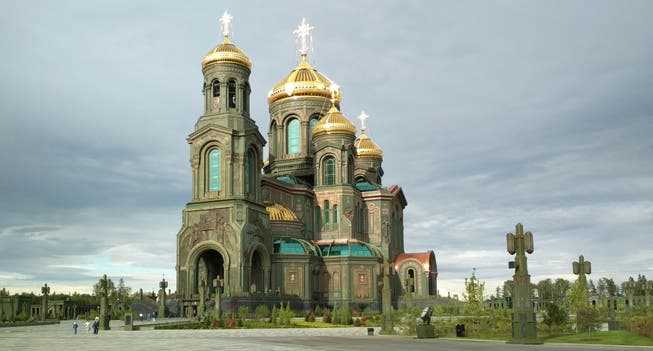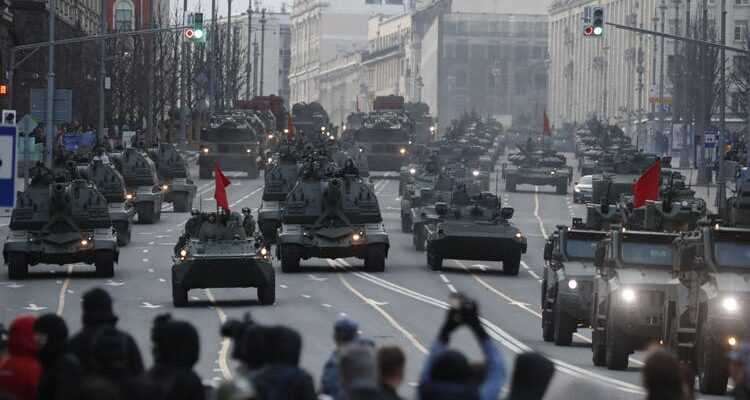The Soviet triumph over Nazi Germany has become the sacral core of the Putin regime’s legitimacy. Accordingly pompous and martial the 9th of May is celebrated as Victory Day. But it’s not about peace, it’s about resentment and revenge. Now the death cult has turned into a real war.
The heroic myth of the Red Army’s victory over Nazi Germany rolls up on Moscow’s Tverskaya Street in modern gear.
I caught myself with a strange feeling: For about ten years I’ve been afraid of public holidays and other official dates because I know that the state power likes to combine them with thorough cleansing.
Now I’m anxiously awaiting May 9, when Putin may want to hold a parade to celebrate his victory over Ukraine’s imaginary Nazism, possibly even with a parade of imprisoned “Banderovtsy” on Red Square – they already had it in August 2014 Ukrainian prisoners of war presented in Donetsk. Behind their column, a street cleaning machine scrubbed away their tracks. This is what happened to the Germans in Moscow in 1944. Today, the whole world looks to May 9 with trepidation because everyone knows that Putin must show his bloodthirsty audience a “victory” — even if it’s in the firelight of a nuclear blast.
Victory Day has seen a dizzying development in Putin’s Russia. The “teary-eyed holiday” that it was earlier in the century became a military-patriotic show – a gigantic symbolic machine to which the country was subjected.
constant liturgy
Basically, on May 9th, Putin’s state found its most important point of reference, its founding myth. This dates neither to 1917, nor to 1991, nor to 1999 – although why not actually declare the demolition of Moscow residential buildings by the FSB in September 1999 as the starting point? – but to 1945 in Yalta and Potsdam, when Stalin stood over the world map with a pencil in his hand. Putin probably feels like the generalissimo in Fyodor Reshetnikov’s monumental painting – although in reality he is more like Charlie Chaplin’s great dictator in the famous scene in which he, in his delusions of grandeur, takes the globe off the stand and twirls it around his finger and lets it dance on your feet – until it bursts.
The heroic myth of victory need not correspond to reality – it is the subject of blind faith, its function is to persuade.
From the mid-nineties, the Russian May 9 began to spread throughout history, becoming both a commemorative cult and a blueprint for the future. It was no coincidence that the first stickers with the boastful slogan “We can repeat that” appeared on cars, with tasteless images such as the hammer and sickle violating a swastika. Does one have to mention what became of this rape cult in Bucha and Irpin?
Victory Day became the lens through which Russia looks at the world, presenting its slights, complexes, desires, aggression and resentments. The holiday has become a constant liturgy, an ecstatic and mystical reliving of a past that replaces a not very happy present for people.
Monstrous Victory Cathedral
In the last twenty years, Victory Day has taken on all the traits of a religious cult. At the center of this symbolic universe rises the monstrous Victory Cathedral in Kubinka near Moscow, the main church of the Russian Armed Forces, which looks as if it was painted from a Star Wars film set or taken from a Gothic comic.
There it stands, sinister, menacing, in an open field in the middle of a frighteningly symmetrical lawn, imbued with number magic like a Masonic hall: diameter of base of main dome 19.45 meters; largest diameter of the main dome 22.43 meters (at 10:43 p.m. on May 8, Germany’s capitulation was signed); the mosaics inside cover an area of 2644 square meters, which corresponds to the number of holders of the First Class Order of Glory. And so forth. The metal steps are cast from captured German weapons, and one of the “relics” in the cathedral is Hitler’s peaked cap. In its zeal to portray victory over Nazi Germany, this militaristic version of orthodoxy descends into pathos, comedy, and kitsch.

Militarist version of orthodoxy: the main church of the Armed Forces of Russia in Patriot Park, Moscow Region.
In honor of the cult of victory, processions of the Immortal Regiment take place, reminiscent of Crusades. Originally a grassroots civil society initiative by employees of Tomsk TV 2, the ritual was adopted by propaganda, which distorted it and perverted it into a bureaucratic display of state-administered patriotism, in which state officials are ordered to parade ready-made portraits of unknown heroes. A few private individuals with portraits of their ancestors are lost in the lies and performances of blatant freaks: Stalinists carry pictures of their idol, and in one such procession the defected heroine of Crimea, Natalia Poklonskaya, marched with an icon of Nicholas II.
In fact, the heroic portraits bear traits of icons. A few years ago, a propaganda film commissioned by an anti-abortion movement circulated online: a young woman tells her boyfriend on the phone that she is pregnant, who then says that she should have an abortion. The woman thinks, and then, in the style of a “talking icon”, a war nurse from the Immortal Regiment from the portrait on the wall begins to speak to her: “Don’t drift off, you’ll have a son, a soldier!” Then, quite typically, the man disappears from the plot, the woman becomes a single mother and, years later, attends the victory parade with her son.
Biopolitics of Victory
The heroic myth of victory does not have to correspond to reality – it is the object of blind faith, its function is to convince. The 28 Panfilov heroes, Soviet martyrs of the first class, are well known. The Guards infantrymen are said to have stopped a division of German tanks at Dubosekowo in front of Moscow. However, in November 1947, the Kharkov military prosecutor found out that one of the “fallen” heroes had surrendered as a prisoner of war in the spring of 1942 and had served the Germans.
Investigations revealed that the whole story was fabricated by a correspondent for Krasnaya Zvezda (Red Star in English) named Alexander Krivitsky based on actual fighting in the region. Despite everything, the legend developed its own logic and found its way into the Soviet canon of patriotism. When the director of the State Archives, Sergei Mironenko, told about this forgery in 2015, he was immediately accused of Russophobia. Then-Culture Minister Vladimir Medinsky declared that a myth that had inspired generations of Soviet citizens was more important than historical facts, and Mironenko was soon sacked from his post.
Victory has become a sacred object, a space where it is impossible to criticize Stalin and the Soviet Union.
The cult of victory in World War II grips the masses and is adorned with triumphant insignia – decorated cars and shop windows, historical re-enactments, cosplays from wartime and travesties, children in military uniforms, buggies and cots in tank designs. Apparently, children are given a special role here, to legitimize victims and to sanction violence and death through a higher morality.
At the same time, the cult of victory is inscribed in the spring rites, with young green growing on dead, scorched earth. Here one can speak of the biopolitics of victory, of the creation of new human masses: the children are the “new soldiers who give birth to women,” to quote the apocryphal phrase attributed to Georgy Zhukov. It’s no coincidence that the child saved from abortion goes to the victory parade in the pro-life video and that an embryo from the womb on an advertising poster for the “For Life” movement appeals to the population: “You protect me today, I’ll protect you tomorrow!” Elsewhere, the child is seen at the age of five with a helmet and a machine gun.
right of the strongest
Victory has become a sacred object, a space where it is impossible to criticize the Soviet Union, the “victorious people”, Stalin and Zhukov, where the law of the jungle is blessed and an isolationist consciousness along the lines of ” It’s just us against the rest of the world’. The cult of victory has become a full-fledged state ideology that would theoretically be forbidden under Article 13 of the Constitution of the Russian Federation – but who cares about the constitution in Russia today?
«Dekoder» – German voice of liberal Russia
currently· The independent and non-profit internet platform Decoder.org makes texts from independent, liberal Russian media available to the German-speaking public on a weekly basis. At the same time, it opens up the reality of Russia to the readers through scientific contextual articles. The aim is to enrich the debates on Russia in German-speaking countries with journalistic quotes. Particular attention is paid to independent Internet media that are not financed and controlled by the Russian state.
In the name of victory, laws are also passed that regulate historical memory, and there is repression: Alexei Navalny was tried in 2021 on a fabricated charge of “insulting a veteran”.
And now, in the name of victory, Russia has launched an aggressive war of conquest.
The invasion of Ukraine is the most important and terrifying effect of the militaristic May 9 religion: instead of celebrating victory, celebrating the end of the war, instead of celebrating peace, Russia has come to praise the war. Victory has been replaced with a permanent battle. Instead of a sigh of relief, a “Never again”, instead of the anathema “Don’t go to war”, as it was initially cultivated after 1945, Russia has written the revanchist slogan “We can repeat that” on its flags. Like an incantation, it is repeated over and over again. The idea of peace turned into a bloodthirsty war cult that is now costing tens of thousands of lives.
irony of fate
This is exactly what happened on February 24, 2022: under the guise of “denazification” in Ukraine, copied from fake history books and put together from propaganda clichés, Russia unleashed the biggest war in Europe since the Second World War. One wanted to repeat 1945, but Russia misjudged its role in this bloody historical reconstruction: the irony of fate wants it to play not the Soviet liberator, but the fascist German conqueror.
History has thus drawn a wide circle and closed it. The snake bites its own tail, the victors over the Nazis themselves became their pathetic image. The real heirs of 1945 today are the Ukrainians who bravely defend their homeland and their democracy, and not the Russian occupiers who invaded a foreign land to murder, rape, rob and pillage.
Anyone who honors the commemoration of the great victory over National Socialism cannot help but wish Russia a defeat in this culpable, shameful and senseless war.
Sergei Medvedev, born 1966, is a Russian political scientist, historian and journalist. He was a professor at the Higher School of Economics in Moscow. For his collection of essays “The Return of the Russian Leviathan” he received the 2020 Pushkin House Book Prize for the best English-language book on Russia. His article first appeared on the Holod website. He is taken over by «decoder». – Translated from the Russian by Ruth Altenhofer.
